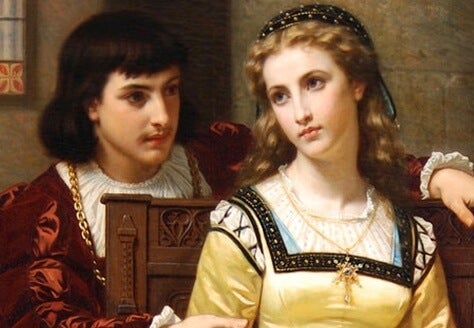William Shakespeare: Biography of the Immortal Bard


Written and verified by the psychologist Valeria Sabater
Ben Johnson, a famous 16th-century poet and playwright, said of William Shakespeare that he was ageless, and his genius would transcend time. He wasn’t wrong. His works have been translated into more than 100 languages. His stories, characters, and sayings have influenced our culture, showing us how the magic of love is created and the pain of betrayal, deception, and war.
Also known as the Immortal Bard of Avon, Shakespeare was a poet and playwright who was revered in his time. However, he also acquired a remarkable transcendence during the Victorian era. More than 400 years have passed since his death, and, since then, his works have been adapted thousands of times, almost everywhere in the world.
Characters like Hamlet, Shylock, Lady Macbeth, Viola, Rosalind, or Caliban from The Tempest often go far beyond the classic archetypes. That, perhaps, was William Shakespeare’s greatest skill. Because, just when we think we’re getting to know them, something happens that surprises us and draws us even nearer to the plot.
With his skillful pen, he was able to trace the contours of already immortal figures. Those tormented kings, merchants, witches, or sweethearts in love have the same complexes as all of us. The reader or viewer saw pieces of themselves in the past, crouched on the stage and embedded in those magnificent characters, those who read him these days can see the same.

Early years: the beginnings of a young actor and writer
William Shakespeare was born in 1564 in Stratford-upon-Avon, Warwickshire, England. His father, John Shakespeare, was a counselor, and his mother, Mary Arden, was a wealthy lady of good standing.
Of these early years of childhood and youth, we know very little. However, from 1582 onward, the family’s financial problems became known. Shakespeare then had to give up his studies and work as a butcher.
At the age of 18, he got Anne Hathaway, the daughter of a local farmer, pregnant. After the baby girl’s birth, the couple married, and young William decided to leave with his family for London. He had one goal in mind: to make his living as an actor and writer.
When he arrived in the British capital, he had no problems joining the theater group The Chamberlain’s Men, which began to perform with great success.
The birth of the playwright
From 1592 onward, the Bard’s career really began to take off. This playwright from Avon began to acquire real fame in the London stages. His patron, the young Henry Wriothesley, Earl of Southampton, brought him into the most acclaimed intellectual circles of the time. This influence, along with Shakespeare’s open and even libertine character, shaped a rather hectic social life.
He formed a good friendship with other authors such as Christopher Marlowe, Ben Johnson, Robert Greene, and Richard Burbage. All of them were amazed by his early works. Thus, Henry IV, (part one) and later Henry IV (part two), along with Henry V, achieved remarkable success on the London theater scene.

Later came Richard II, Richard III, and Titus Andronicus. On the other hand, with comedies such as The Two Gentleman of Verona or A Midsummer Night’s Dream, he demonstrated the ingenuity, originality, and charm of stories that increasingly enraptured the audience of the time.
By 1597, the Bard of Avon had written 15 of the 38 works we know today. He was a rich man, owned the most distinguished houses in Stratford, and could offer his family anything they wanted. William Shakespeare certainly enjoyed that lifestyle.
He was able to write scripts for his theater company, acted when he wanted to, and, in 1599, they even rebuilt The Globe Theatre from the ruins of The Theatre to create a playhouse.
The last years of William Shakespeare
At the turn of the century, his literary works continued to grow and mature. From 1600 onward, great immortal legacies in our history appeared on the scene, such as Troilus and Cressida, Hamlet, Othello, King Lear, or A Midsummer Night’s Dream. The dialogues were now richer, more dynamic, and there was also a more polished and profound poetic style.
Thus, the texts that we can find in Hamlet are quite far-removed from those that we can see from previous works such as Henry V. The language is more skillful and his lines sharper, and he was able to effectively portray the psychological depth of the characters. Likewise, in this period, William Shakespeare also published his famous Sonnets.
His latest works, such as Cymbeline or The Tempest, gave shape to a genre more in the vein of tragicomedy, where the stories are a little more somber, but without ever losing the ability to surprise the viewer.
In 1613, after performing Henry VIII, the Globe tragically burnt down in a fire. It took almost a year to reopen again. However, by then, William Shakespeare had retired to Stratford.

He died soon after, at the age of 52. Although the exact cause of his death is unknown, written documents relate his love of drinking with his playwright friends, such as Ben Johnson. Fever and the continuous excesses caused an early end to someone who, perhaps, would have been able to give us even more works, and even more immortal creations.
Style and controversy over the works of William Shakespeare
A shadow that often hangs over the figure of William Shakespeare is whether he was the author of all his works. Furthermore, people say that Mark Twain, Henry James, and Sigmund Freud even came to wonder if such a person really ever existed. Others have said that people like Christopher Marlowe and, especially, the Earl of Oxford Edward DeVere, were behind some of his works.
To this day, we don’t know whether there was a straw man behind the figure of William Shakespeare. Oxford University Press, for example, points out that Shakespeare and Marlowe came to work together. Thus, many of the works attributed to Shakespeare were, in fact, the result of mutual collaboration.
Shakespeare and the art of enriching a language
Beyond all these questions of whether all Shakespearean works were really penned by the Bard of Avon, there’s an undeniable reality. The influence of his works has been immense. One of his skills was to shape language to suit his artistic purposes.
In doing so, he enriched the English language in a remarkable way. Experts estimate that, thanks to William Shakespeare, up to 2000 new words came into existence. Thus, terms such as “auspicious”, “waning”, and “time-honored” are the result of his magnificent inventiveness.
On the other hand, his characters have also shaped our popular culture and even the world of psychology. They’ve become key references to help understand many realities.
Acting like an Othello, suffering from Oedipus complex or being like Romeo and Juliet all give us an immediate idea of what a person is referring to. In essence, William Shakespeare is still, today, that immortal and unrepeatable figure that continues to inspire us so much.
Ben Johnson, a famous 16th-century poet and playwright, said of William Shakespeare that he was ageless, and his genius would transcend time. He wasn’t wrong. His works have been translated into more than 100 languages. His stories, characters, and sayings have influenced our culture, showing us how the magic of love is created and the pain of betrayal, deception, and war.
Also known as the Immortal Bard of Avon, Shakespeare was a poet and playwright who was revered in his time. However, he also acquired a remarkable transcendence during the Victorian era. More than 400 years have passed since his death, and, since then, his works have been adapted thousands of times, almost everywhere in the world.
Characters like Hamlet, Shylock, Lady Macbeth, Viola, Rosalind, or Caliban from The Tempest often go far beyond the classic archetypes. That, perhaps, was William Shakespeare’s greatest skill. Because, just when we think we’re getting to know them, something happens that surprises us and draws us even nearer to the plot.
With his skillful pen, he was able to trace the contours of already immortal figures. Those tormented kings, merchants, witches, or sweethearts in love have the same complexes as all of us. The reader or viewer saw pieces of themselves in the past, crouched on the stage and embedded in those magnificent characters, those who read him these days can see the same.

Early years: the beginnings of a young actor and writer
William Shakespeare was born in 1564 in Stratford-upon-Avon, Warwickshire, England. His father, John Shakespeare, was a counselor, and his mother, Mary Arden, was a wealthy lady of good standing.
Of these early years of childhood and youth, we know very little. However, from 1582 onward, the family’s financial problems became known. Shakespeare then had to give up his studies and work as a butcher.
At the age of 18, he got Anne Hathaway, the daughter of a local farmer, pregnant. After the baby girl’s birth, the couple married, and young William decided to leave with his family for London. He had one goal in mind: to make his living as an actor and writer.
When he arrived in the British capital, he had no problems joining the theater group The Chamberlain’s Men, which began to perform with great success.
The birth of the playwright
From 1592 onward, the Bard’s career really began to take off. This playwright from Avon began to acquire real fame in the London stages. His patron, the young Henry Wriothesley, Earl of Southampton, brought him into the most acclaimed intellectual circles of the time. This influence, along with Shakespeare’s open and even libertine character, shaped a rather hectic social life.
He formed a good friendship with other authors such as Christopher Marlowe, Ben Johnson, Robert Greene, and Richard Burbage. All of them were amazed by his early works. Thus, Henry IV, (part one) and later Henry IV (part two), along with Henry V, achieved remarkable success on the London theater scene.

Later came Richard II, Richard III, and Titus Andronicus. On the other hand, with comedies such as The Two Gentleman of Verona or A Midsummer Night’s Dream, he demonstrated the ingenuity, originality, and charm of stories that increasingly enraptured the audience of the time.
By 1597, the Bard of Avon had written 15 of the 38 works we know today. He was a rich man, owned the most distinguished houses in Stratford, and could offer his family anything they wanted. William Shakespeare certainly enjoyed that lifestyle.
He was able to write scripts for his theater company, acted when he wanted to, and, in 1599, they even rebuilt The Globe Theatre from the ruins of The Theatre to create a playhouse.
The last years of William Shakespeare
At the turn of the century, his literary works continued to grow and mature. From 1600 onward, great immortal legacies in our history appeared on the scene, such as Troilus and Cressida, Hamlet, Othello, King Lear, or A Midsummer Night’s Dream. The dialogues were now richer, more dynamic, and there was also a more polished and profound poetic style.
Thus, the texts that we can find in Hamlet are quite far-removed from those that we can see from previous works such as Henry V. The language is more skillful and his lines sharper, and he was able to effectively portray the psychological depth of the characters. Likewise, in this period, William Shakespeare also published his famous Sonnets.
His latest works, such as Cymbeline or The Tempest, gave shape to a genre more in the vein of tragicomedy, where the stories are a little more somber, but without ever losing the ability to surprise the viewer.
In 1613, after performing Henry VIII, the Globe tragically burnt down in a fire. It took almost a year to reopen again. However, by then, William Shakespeare had retired to Stratford.

He died soon after, at the age of 52. Although the exact cause of his death is unknown, written documents relate his love of drinking with his playwright friends, such as Ben Johnson. Fever and the continuous excesses caused an early end to someone who, perhaps, would have been able to give us even more works, and even more immortal creations.
Style and controversy over the works of William Shakespeare
A shadow that often hangs over the figure of William Shakespeare is whether he was the author of all his works. Furthermore, people say that Mark Twain, Henry James, and Sigmund Freud even came to wonder if such a person really ever existed. Others have said that people like Christopher Marlowe and, especially, the Earl of Oxford Edward DeVere, were behind some of his works.
To this day, we don’t know whether there was a straw man behind the figure of William Shakespeare. Oxford University Press, for example, points out that Shakespeare and Marlowe came to work together. Thus, many of the works attributed to Shakespeare were, in fact, the result of mutual collaboration.
Shakespeare and the art of enriching a language
Beyond all these questions of whether all Shakespearean works were really penned by the Bard of Avon, there’s an undeniable reality. The influence of his works has been immense. One of his skills was to shape language to suit his artistic purposes.
In doing so, he enriched the English language in a remarkable way. Experts estimate that, thanks to William Shakespeare, up to 2000 new words came into existence. Thus, terms such as “auspicious”, “waning”, and “time-honored” are the result of his magnificent inventiveness.
On the other hand, his characters have also shaped our popular culture and even the world of psychology. They’ve become key references to help understand many realities.
Acting like an Othello, suffering from Oedipus complex or being like Romeo and Juliet all give us an immediate idea of what a person is referring to. In essence, William Shakespeare is still, today, that immortal and unrepeatable figure that continues to inspire us so much.
All cited sources were thoroughly reviewed by our team to ensure their quality, reliability, currency, and validity. The bibliography of this article was considered reliable and of academic or scientific accuracy.
- Ackroyd, Peter (2008) Shakespeare, la biografía. Madrid: Edhasa
This text is provided for informational purposes only and does not replace consultation with a professional. If in doubt, consult your specialist.







